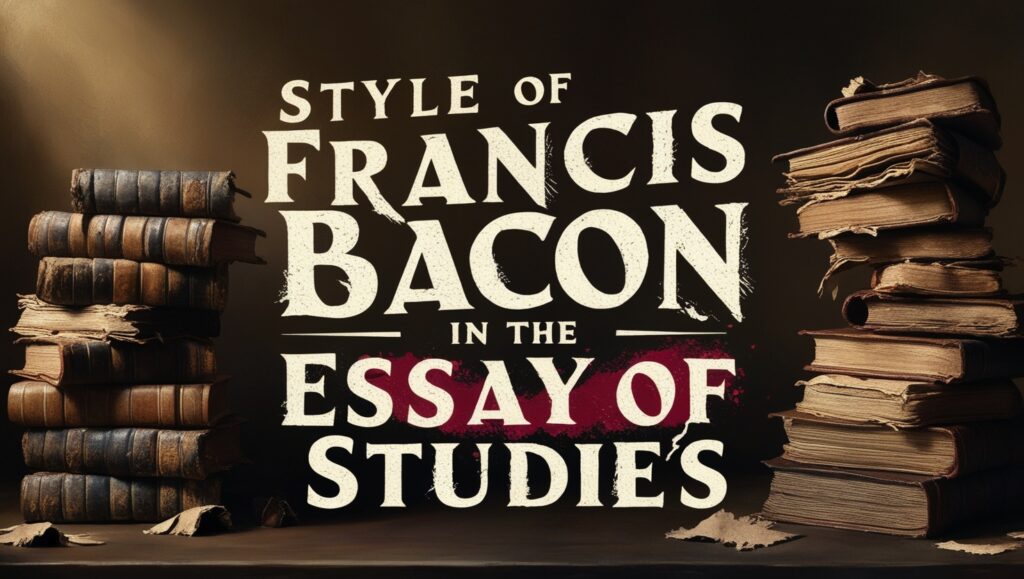
Style of Francis Bacon in the Essay Of Studies
Francis Bacon’s essay Of Studies is a remarkable piece that exhibits his trademark style, which includes brevity, clarity, an aphoristic tone, and an emphasis on practical wisdom. Bacon, often hailed as the father of the English essay, wrote in a manner that reflected his philosophical background and his desire to impart knowledge concisely and efficiently. His essays, particularly Of Studies, are recognized for their terse, compact style, filled with aphorisms and logical reasoning. These qualities make his essays stand apart from those of later writers, who tended toward a more elaborate, discursive approach.
This critical examination of Bacon’s style in Of Studies will focus on several key aspects, including his use of aphorisms, structure, balance between thought and language, focus on practicality, and his penchant for persuasive reasoning.
Aphoristic Style
One of the most notable features of Bacon’s style in Of Studies is his aphoristic way of writing. Aphorisms are concise, witty statements that convey a general truth or insight. Bacon’s essays are replete with such statements, each of which could stand alone as a proverb or maxim. This aphoristic style is perhaps Bacon’s most distinguishing characteristic as a writer. In Of Studies, almost every sentence is a self-contained unit of wisdom, offering insight into the value of studying, reading, and knowledge. For example, Bacon writes:
“Reading maketh a full man; conference a ready man; and writing an exact man.”
This line, succinct and profound, encapsulates the roles that reading, discussion, and writing play in intellectual development. Bacon doesn’t waste words, and he delivers his thoughts in a way that leaves a lasting impression on the reader. Such aphorisms are memorable because they are brief, focused, and often surprising in their insights. Bacon’s ability to condense complex ideas into short, impactful phrases is one of the hallmarks of his style.
This pithiness also reflects Bacon’s broader philosophical outlook. As a proponent of the empirical method, Bacon was committed to clarity, directness, and utility in communication. His aphoristic style not only reflects his desire for precision but also suggests that knowledge should be functional and immediately useful, rather than elaborate or ornate.
Logical Structure and Organization
Another important aspect of Bacon’s style in Of Studies is his careful structuring of the essay. Bacon divides his essay into clearly defined sections, each of which builds logically on the one preceding it. He begins by discussing the purposes and benefits of study, then moves on to specific advice on how to approach reading and study in a practical way. Finally, he closes the essay with a discussion of the dangers of overstudying and the importance of applying one’s knowledge in life.
This structured approach is typical of Bacon’s essays, where clarity of thought and systematic presentation are paramount. He doesn’t digress or allow his argument to wander; instead, he presents his ideas in a logical sequence, making it easy for the reader to follow his line of reasoning. In Of Studies, this methodical approach ensures that Bacon’s points are both convincing and accessible.
Bacon’s essays are often noted for their scientific approach to reasoning. Though they are philosophical in nature, they are grounded in the real world, with an emphasis on practical applications. In Of Studies, for instance, Bacon is not interested in the abstract value of learning, but in how knowledge can be used to improve one’s character and conduct. The structure of his essay reflects this pragmatic outlook, with each section focusing on the benefits of learning and how it can be applied in everyday life.
Balance of Thought and Language
Bacon’s style in Of Studies also reflects a careful balance between thought and language. Unlike many of his contemporaries, who tended toward elaborate and florid prose, Bacon’s language is clear, direct, and unadorned. His sentences are neither too long nor too short, and they are carefully crafted to express his ideas with maximum efficiency.
Bacon’s prose is characterized by clarity, but it is never dull or simplistic. Rather, it achieves a kind of elegance through its precision and economy. Bacon’s language serves his ideas, rather than calling attention to itself. He uses few adjectives and avoids the elaborate metaphors and similes that were popular in Elizabethan prose. Instead, he prefers to let his ideas speak for themselves, with minimal embellishment.
At the same time, Bacon’s language is rich in meaning. Every word is carefully chosen, and his sentences are packed with intellectual substance. Bacon’s ability to convey complex ideas in simple, clear language is one of his greatest strengths as a writer. For example, in Of Studies, Bacon writes:
“Some books are to be tasted, others to be swallowed, and some few to be chewed and digested.”
In this sentence, Bacon uses a metaphor to convey the idea that different books require different levels of engagement. While the metaphor is simple, it is also rich in meaning, suggesting that not all knowledge is equally valuable and that some books require careful thought and reflection, while others can be absorbed more quickly.
Emphasis on Practicality and Utility
One of the central themes of Of Studies is the practical value of knowledge, and this focus on practicality is reflected in Bacon’s style. Bacon is not interested in learning for its own sake; rather, he is concerned with how knowledge can be applied to improve oneself and one’s society. His style reflects this emphasis on utility, with clear, straightforward language that is designed to convey practical advice rather than abstract ideas.
For example, in Of Studies, Bacon advises readers to approach different kinds of learning in different ways, depending on their purpose:
“Read not to contradict and confute, nor to believe and take for granted, nor to find talk and discourse, but to weigh and consider.”
This advice is clear, direct, and immediately applicable. Bacon is not concerned with literary flourishes or rhetorical embellishments; he is focused on delivering practical wisdom that can be used in everyday life. His language reflects this utilitarian approach, with simple, straightforward sentences that are designed to convey maximum meaning with minimum distraction.
Bacon’s focus on practicality is also reflected in his advice on reading. In Of Studies, he distinguishes between different kinds of books and suggests that readers should approach each type of book in a different way. This is a highly pragmatic approach to learning, and it reflects Bacon’s broader belief that knowledge should be useful and applicable in real life.
Use of Persuasive Reasoning
Bacon’s style is also marked by his skillful use of reasoning and argumentation. In Of Studies, as in many of his essays, Bacon presents his ideas in a logical, step-by-step fashion, using reason and evidence to persuade the reader. He doesn’t rely on emotional appeals or rhetorical flourishes; instead, he builds his argument carefully and systematically, presenting each point in turn and supporting it with clear reasoning.
For example, in the opening paragraph of Of Studies, Bacon explains why studying is valuable:
“Studies serve for delight, for ornament, and for ability.”
He then goes on to explain each of these purposes in detail, providing examples and reasoning to support his argument. This methodical approach ensures that the reader is fully persuaded by Bacon’s argument, as each point is clearly explained and supported.
Bacon’s reasoning is often deductive, moving from general principles to specific applications. In Of Studies, he begins with the general principle that studies are valuable for delight, ornament, and ability, and then moves on to explain how these benefits can be applied in different areas of life. This logical, reasoned approach is one of the defining characteristics of Bacon’s style, and it reflects his background as a philosopher and scientist.
Conciseness and Compression of Ideas
One of the most striking features of Bacon’s style is his ability to compress complex ideas into short, pithy statements. This conciseness is evident throughout Of Studies, where Bacon manages to convey a wealth of wisdom in just a few short paragraphs. Bacon doesn’t waste words, and every sentence is packed with meaning.
For example, when discussing the benefits of reading, Bacon writes:
“Histories make men wise; poets witty; the mathematics subtle; natural philosophy deep; moral grave; logic and rhetoric able to contend.”
In this single sentence, Bacon covers a broad range of disciplines, highlighting the specific benefits of each. This kind of compression is typical of Bacon’s style, and it reflects his desire to convey as much information as possible in the fewest possible words.
Bacon’s conciseness also reflects his background as a philosopher and scientist. Like his scientific method, his writing is focused on clarity, precision, and efficiency. He is not interested in flowery language or elaborate rhetoric; he is concerned with conveying knowledge in the most effective and efficient way possible.
Conclusion
Francis Bacon’s style in Of Studies is marked by its clarity, brevity, aphoristic quality, and practical focus. Bacon’s use of concise, pithy statements allows him to convey complex ideas with minimal elaboration, while his structured approach ensures that his argument is easy to follow. His emphasis on practicality reflects his belief that knowledge should be useful and applicable in everyday life, while his use of persuasive reasoning ensures that his ideas are convincing.
In Of Studies, as in much of his writing, Bacon demonstrates his ability to distill profound truths into short, memorable phrases, making his essays both intellectually rich and highly readable. His style reflects his broader philosophical outlook, which emphasizes clarity, utility, and the importance of knowledge in improving oneself and society. In this way, Bacon’s essay Of Studies remains a timeless piece of writing that continues to resonate with readers for its wisdom, style, and practicality.

